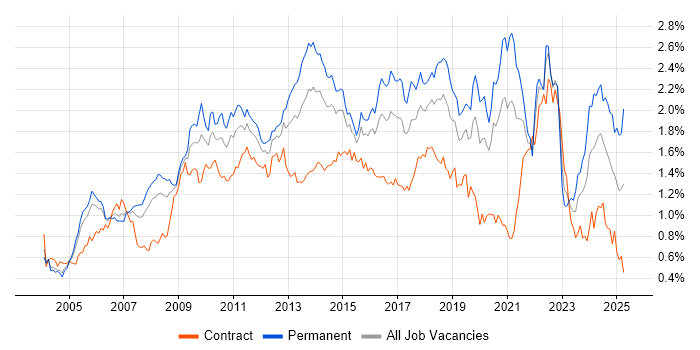Microsoft .NET Framework
Central London > City of London
The table below provides summary statistics and contractor rates for jobs advertised in the City of London requiring .NET Framework skills. It covers contract job vacancies from the 6 months leading up to 26 February 2026, with comparisons to the same periods in the previous two years.
| 6 months to 26 Feb 2026 |
Same period 2025 | Same period 2024 | |
|---|---|---|---|
| Rank | 125 | 108 | 106 |
| Rank change year-on-year | -17 | -2 | -4 |
| Contract jobs citing .NET Framework | 3 | 12 | 20 |
| As % of all contract jobs in the City of London | 0.15% | 0.65% | 0.86% |
| As % of the Libraries, Frameworks & Software Standards category | 0.68% | 2.50% | 4.02% |
| Number of daily rates quoted | 3 | 9 | 14 |
| 10th Percentile | £430 | £388 | £461 |
| 25th Percentile | £456 | £458 | £556 |
| Median daily rate (50th Percentile) | £500 | £550 | £638 |
| Median % change year-on-year | -9.09% | -13.73% | +6.25% |
| 75th Percentile | £538 | £675 | £704 |
| 90th Percentile | £560 | £865 | £750 |
| Central London median daily rate | £500 | £675 | £650 |
| % change year-on-year | -25.93% | +3.85% | +8.33% |
All Software Libraries and Frameworks
City of London
.NET Framework falls under the Software Libraries and Frameworks category. For comparison with the information above, the following table provides summary statistics for all contract job vacancies requiring technical specification, industry standards, software libraries and framework skills in the City of London.
| Contract vacancies with a requirement for technical specification, industry standards, software libraries and framework skills | 444 | 480 | 498 |
| As % of all contract IT jobs advertised in the City of London | 22.39% | 26.04% | 21.31% |
| Number of daily rates quoted | 302 | 302 | 341 |
| 10th Percentile | £363 | £408 | £400 |
| 25th Percentile | £456 | £463 | £463 |
| Median daily rate (50th Percentile) | £550 | £575 | £575 |
| Median % change year-on-year | -4.35% | - | -8.00% |
| 75th Percentile | £675 | £683 | £700 |
| 90th Percentile | £750 | £775 | £800 |
| Central London median daily rate | £550 | £575 | £575 |
| % change year-on-year | -4.35% | - | -8.00% |
| Number of hourly rates quoted | 2 | 1 | 1 |
| 10th Percentile | £43.83 | - | - |
| 25th Percentile | £45.83 | £36.75 | £46.25 |
| Median hourly rate | £51.38 | £38.50 | £47.50 |
| Median % change year-on-year | +33.46% | -18.95% | -20.17% |
| 75th Percentile | £56.67 | £40.25 | £48.75 |
| 90th Percentile | £58.50 | - | - |
| Central London median hourly rate | £36.00 | £40.00 | £47.50 |
| % change year-on-year | -10.00% | -15.79% | -20.17% |
.NET Framework
Job Vacancy Trend in the City of London
Historical trend showing the proportion of contract IT job postings citing .NET Framework relative to all contract IT jobs advertised in the City of London.

.NET Framework
Daily Rate Trend in the City of London
Contractor daily rate distribution trend for jobs in the City of London citing .NET Framework.

.NET Framework
Daily Rate Histogram in the City of London
Daily rate distribution for jobs citing .NET Framework in the City of London over the 6 months to 26 February 2026.
.NET Framework
Hourly Rate Trend in the City of London
Contractor hourly rate distribution trend for jobs in the City of London citing .NET Framework.

.NET Framework
Co-Occurring Skills & Capabilities in the City of London by Category
The following tables expand on the one above by listing co-occurrences grouped by category. They cover the same employment type, locality and period, with up to 20 co-occurrences shown in each category:
